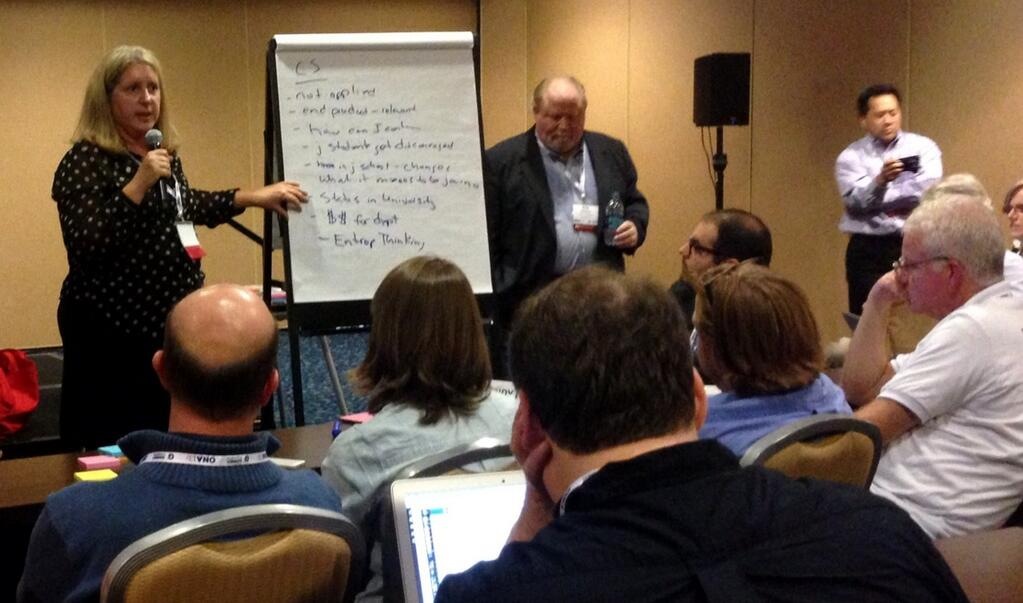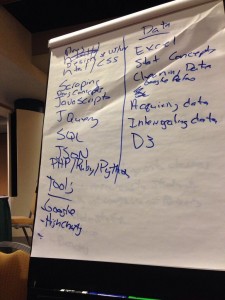Hack the Curriculum at ONA13
Programming and Data – Hack the Curriculum
Notes From Brainstorming Session
October 18, 2013 ONA Atlanta

At the Online News Association in Atlanta on Oct. 18, the Knight Foundation sponsored a Hack the Curriculum workshop with the goal of generating as many ideas as possible about the future of journalism curriculum. Participants included faculty, students and professionals, and groups were formed around interest areas, including cross-disciplinary and cross-university collaborations, teaching hospital model, entrepreneurial journalism and introducing programming and data into the curriculum. I led the group that discussed the programming/data area, and here are my transcribed notes from the session.
Participants:
- Cindy Royal, Texas State University, Associate Professor & Knight Journalism Fellow at Stanford
- Marie Shanahan, University of Connecticut; Associate Professor
- Rob Quigley, University of Texas; Senior Lecturer
- Jon Glass, Syracuse; General Manager, Collaborative Media Room & Executive Producer
- Jay Hamliton, Stanford University; Director Graduate School of Journalism
- Lindsey Cook, Student, University of Georgia, AP-Google Scholar
- Jeremy Rue, Berkeley, Lecturer
- Steve Fox, Senior Lecturer, University of Massachusetts – Amherst
- Katie Culver, Wisconsin, Assistant Professor
- Eva Constantaras, Google Scholar and InternewsKE Journalist
- Bethany Swain, Lecturer, University of Maryland
Why should journalism students study programming and data concepts?
We started out discussing why this was even an important topic to address. In order to be successful in shifting curriculum in this area, we have to be able to articulate the benefits to our students and discipline.
- Employable – there is a demand for communicators with these skills
- Iterative, Critical Thinking, Problem Solving
- New language
- Demystify how technology works
- Unique storytelling opportunities
- Ability to work with programmers
- Advanced media/tech literacy
- Safer way to report corruption; use data to report on corruption from a distance – this was a very interesting comment by Eva Consantaras who has experience in covering corruption.
Computer Science Collaborations
Quite often, it is suggested that we simply send students to computer science to learn these skills or to partner with computer science to develop programming classes. While all felt that collaborations were an option and had potential, they were not without challenges, due to the unique missions of CS and journalism. Some in the group had already exercised collaborations with CS.
Challenges to CS Collaborations
- CS is not applied
- End product in CS exercises not always relevant to journalism majors
- J students get discouraged in CS courses; don’t know how to validate/confirm what they have learned.
- Often difficult to get CS faculty to co-teach a journalism course
- But under right circumstances with right resources, collaborations can be beneficial
Benefits to Teaching in J-School
- Teaching programming in j-school changes what it means to be a journalist; adds to repertoire of discipline
- Raises status of discipline in university
- Can bring $$$ for department
- Encourages entrepreneurial thinking
Partnerships with CS
- Difficult and challenging, but not impossible
- Needs mutual benefit in end product
- Jeremy Rue – J students provided content to a video game course at Berkeley
- Rob Quigley – iPhone app development class, included journalism and CS students but was taught in J school with no CS resources.
Other departments with collaboration potential
- Library and Information Science
- Political Science
- Statistics
Skills Journalism Students Need
Programming
- HTML/CSS
- JavaScript
- JQuery
- SQL
- JSON
- PHP/Ruby/Python
- Frameworks – Rails/Django
Data
- Excel
- General statistics
- Clean data – Google Refine
- Scraping
- Acquiring and interrogating data
- D3
Tools
- Google Fusion Tables and other tools
- HighCharts
- There are others
There were so many things we covered that could be added, and the tools and languages continue to evolve. Students need to be exposed to these areas with lifelong learning in mind. I have covered the majority of these items in my Advanced Online Media course at a very high level, but that is one course, limited as an elective in our graduate program at the moment. Jeremy Rue is teaching Coding for Journalists to undergrads at Berkeley. Berkeley also teaches a Data Journalism course. The potential to develop an entire degree around data journalism and Web development was mentioned.
How To Fit in Curriculum
In lieu of a new degree proposal, there are ways that these topics can be introduced into the curriculum, either in existing courses or by creating new ones that advance topics already covered.
- Online Journalism or basic tools courses – add coding and tools to courses that discuss Web design, video editing, etc.
- Data Journalism course – new course on these topics
- Investigative Reporting/CAR
- Sequence classes – an advanced level after Web design or other course that introduces basic concepts.
- Flipped courses – having students do tutorials and watch videos outside of class and using class time to cover exercises is one way to create more time in the curriculum for additional topics.
Teaching
Some of the biggest challenges to providing students with programming and data skills have to do with who is going to teach them.
- Modules – developed to drop into existing courses
- Provide outside resources to students CodeAcademy, Lynda.com, etc.
- Faculty not comfortable teaching new information, things in which they do not consider themselves expert
- Attitude shift – change way digital is addressed, change language used (nerds, geeks, gizmos, gadgets); reduce condescension toward digital
- Acceptance – convince faculty of the role of programming and data in storytelling
- Recruiting – difficult to find qualified people to teach these topics; phd programs are not developing students in this area; competitive to find professionals doing this type of work who want to move to academia.
- The bottom line is that faculty will need to spend time learning new skills in order to be able to teach what our students need to learn.
Other issues
- Focus on ethics of data – might draw in faculty with that expertise/interest
- Graduate/professional or undergraduate
- Collaborations with professional community – media and tech; we could have used more time to explore this, but particularly in tech-centric areas, there are numerous resources with which to engage.
Conclusion
There are many reasons for teaching programming and data concepts to journalism students and many opportunities in which to add these areas to curriculum. It all depends on the resources you have in your own departments and relationships you are able to create in your university and community. First steps seem to include getting as much acceptance as possible across faculty that programming and data concepts are relevant to storytelling and represent a legitimate future for journalism.
Many thanks to the participants above who contributed to this session. It was a great opportunity to learn from colleagues and peers and to share advice and lessons learned. I hope to see more exercises of this type in the future.
Also, a sincere thank you to Eric Newton and the Knight Foundation for sponsoring this enlightening session. It was an honor to be included as a group leader. Newton unveiled a new grant opportunity, a Challenge Fund, supported by a consortium of journalism organizations to provide funding for curriculum that “hacks” journalism education. The grant will be administered through the Online News Association.
Shameless Plug
I worked on two articles recently that address the role of programming in the curriculum:
With Amy Schmitz-Weiss in Nieman Lab – At the Intersection of Journalism, Data Science, and Digital Media: How Can J-Schools Prep Students for the World They’re Headed Into?
In PBS MediaShift – We Need a Digital-First Curriculum to Teach Modern Journalism
